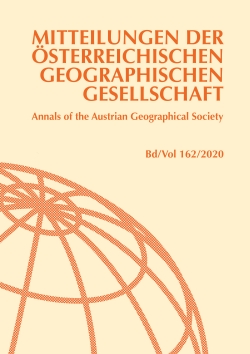
Mitteilungen der Österreichischen Geographischen Gesellschaft Band 162/2020, pp. 25-42, 2021/03/30
Band 162 (Jahresband), Wien 2020
Volume 162 (Annual volume), Vienna 2020

The urban transformations taking place throughout the region of former Yugoslavia are best exemplified in the capitals of the once-communist federation’s successor states. The recent urban developments in the cities of Belgrade, Zagreb, and Sarajevo illustrate the realities of contemporary societies in the Balkans and the socio-political shifts of the period of transition. The built environments of the newly capitalist countries serve as exaggerated, yet emblematic examples of nation-building projects and their deep entwinement with economic processes unfolding throughout post-communist South-Eastern Europe. However, the links between the post-socialist urban and national identity, as well as politics and economy, remain understudied. In this paper, I enquire into the present-day urban transformations of Sarajevo, Belgrade, and Zagreb. I examine these cities within the context of post-Yugoslav economic and political space, exploring the particularities of the creation of built environments that no longer exist on the Yugoslav periphery, but now are at the centre of newly democratic societies. Through the investigation of the political, economic, and architectural particularities of Belgrade Waterfront and Zagreb Manhattan development projects, and Sarajevo City Center commercial complex, I examine the influx of foreign funds – mainly from the Middle East – and their impacts on the construction of regional urban centres. I argue that the modern-day capitals of post-Yugoslav states are developing as products of the interpolation of a communist past into the capitalist present characterised by the perpetual quest for “Europe”, and in line with the broader socio-political and architectural trends in Eastern and South-Eastern Europe. In post-Yugoslavia, urban practices are problematically interwoven with politics: the cities simultaneously serve as displays of geopolitical change and catalysts for social transformation in post-socialist societies.
Keywords: Post-socialist city, urban transformations, Balkans, nationalism, Yugoslavia, Belgrade, Zagreb, Sarajevo